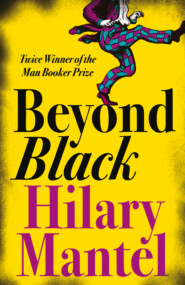
Полная версия:
Beyond Black
Colette knelt on the floor and rummaged as directed. ‘That woman at the end, the couple, the miscarriage – you could have heard a pin drop.’
Al said, ‘“See a pin and pick it up and all the day you’ll have good luck.” My mum told me that. I never do, though. See a pin. Or find money in the street.’
That’s because you’re too fat to see your feet, Colette thought. She said, ‘How did you do that thing with the name? When you were going on about mother love I nearly puked, but I have to hand it to you, you got there in the end.’
‘Alistair? Well, of course, if he’d been called John, you wouldn’t be giving me any credit. You’d have said it was one of my lucky guesses.’ She sighed. ‘Look, Colette, what can I tell you? The boy was standing there. He knew his own name. People do.’
‘The mother, she must have been thinking his name.’
‘Oh yes, I could have picked it out of her head. I know that’s your theory. Mind-reading. Oh God, Colette.’ Al slid down inside the covers. She closed her eyes. Her head dropped back against the pillows. ‘Think that, if you find it easier. But you will admit I sometimes tell people things they’ve yet to find out.’
She hated that phrase of Al’s: ‘Think that, if you find it easier.’ As if she were a child and couldn’t be told the truth. Al only seemed dense – it was part of her act. The truth was, she listened to Radio 4 when they were on the road. She’d got a vocabulary, though she didn’t use it on the trade. She was quite a serious and complicated person, and deep, deep and sly: that was what Colette thought.
Al seldom talked about death. At first when they started working together, Colette had thought the word would slip out, if only through the pressure of trying to avoid it. And sometimes it did; but mostly Al talked about passing, she talked about spirit, she talked about passing into spirit world; to that eventless realm, neither cold nor hot, neither hilly nor flat, where the dead, each at their own best age and marooned in an eternal afternoon, pass the ages with sod all going on. Spirit world, as Al describes it to the trade, is a garden, or to be more accurate a public place in the open air: litter-free like an old-fashioned park, with a bandstand in a heat haze in the distance. Here the dead sit in rows on benches, families together, on gravelled paths between weedless beds, where heat-sozzled flowers bob their heads, heavy with the scent of eau de Cologne: their petals crawling with furry, intelligent, stingless bees. There’s a certain 1950s air about the dead, or early sixties perhaps, because they’re clean and respectable and they don’t stink of factories: as if they came after white nylon shirts and indoor sanitation, but before satire, certainly before sexual intercourse. Unmelting ice cubes (in novelty shapes) chink in their glasses, for the age of refrigeration has come. They eat picnics with silver forks; purely for pleasure, because they never feel hunger, nor gain weight. No wind blows there, only a gentle breeze, the temperature being controlled at a moderate 71° F; these are the English dead, and they don’t have centigrade yet. All picnics are share and share alike. The children never squabble or cut their knees, for whatever happened to them earth-side, they are beyond physical damage now. The sun shall not strike them by day nor the moon by night; they have no red skin or freckles, none of the flaws that make the English so uncouth in summer. It’s Sunday, yet the shops are open, though no one needs anything. A mild air plays in the background, not quite Bach, possibly Vaughan Williams, quite like the early Beatles too; the birds sing along, in the green branches of the seasonless trees. The dead have no sense of time, no clear sense of place; they are beyond geography and history, she tells her clients, till someone like herself tunes in. Not one of them is old or decrepit or uselessly young. They all have their own teeth: or an expensive set of implants, if their own were unsightly. Their damaged chromosomes are counted and shuffled into good order; even the early miscarriages have functioning lungs and a proper head of hair. Damaged livers have been replaced, so their owners live to drink another day. Blighted lungs now suck at God’s own low-tar blend. Cancerous breasts have been rescued from the surgeons’ bin, and blossom like roses on spirit chests.
Al opened her eyes. ‘Col, are you there? I was dreaming that I was hungry.’
‘I’ll ring down for a sandwich, shall I?’
She considered. ‘Get me ham on brown. Wholemeal. Dab of mustard – French, not English. Dijon – tell them cupboard on the left, third shelf. Ask them for – do they do a cheese plate? I’d like a slice of Brie and some grapes. And some cake. Not chocolate. Coffee maybe. Walnuts. It has walnuts on top. Two at the rim and one in the centre.’
Конец ознакомительного фрагмента.
Текст предоставлен ООО «ЛитРес».
Прочитайте эту книгу целиком, купив полную легальную версию на ЛитРес.
Безопасно оплатить книгу можно банковской картой Visa, MasterCard, Maestro, со счета мобильного телефона, с платежного терминала, в салоне МТС или Связной, через PayPal, WebMoney, Яндекс.Деньги, QIWI Кошелек, бонусными картами или другим удобным Вам способом.
Вы ознакомились с фрагментом книги.
Для бесплатного чтения открыта только часть текста.
Приобретайте полный текст книги у нашего партнера:
Полная версия книги
Всего 10 форматов

